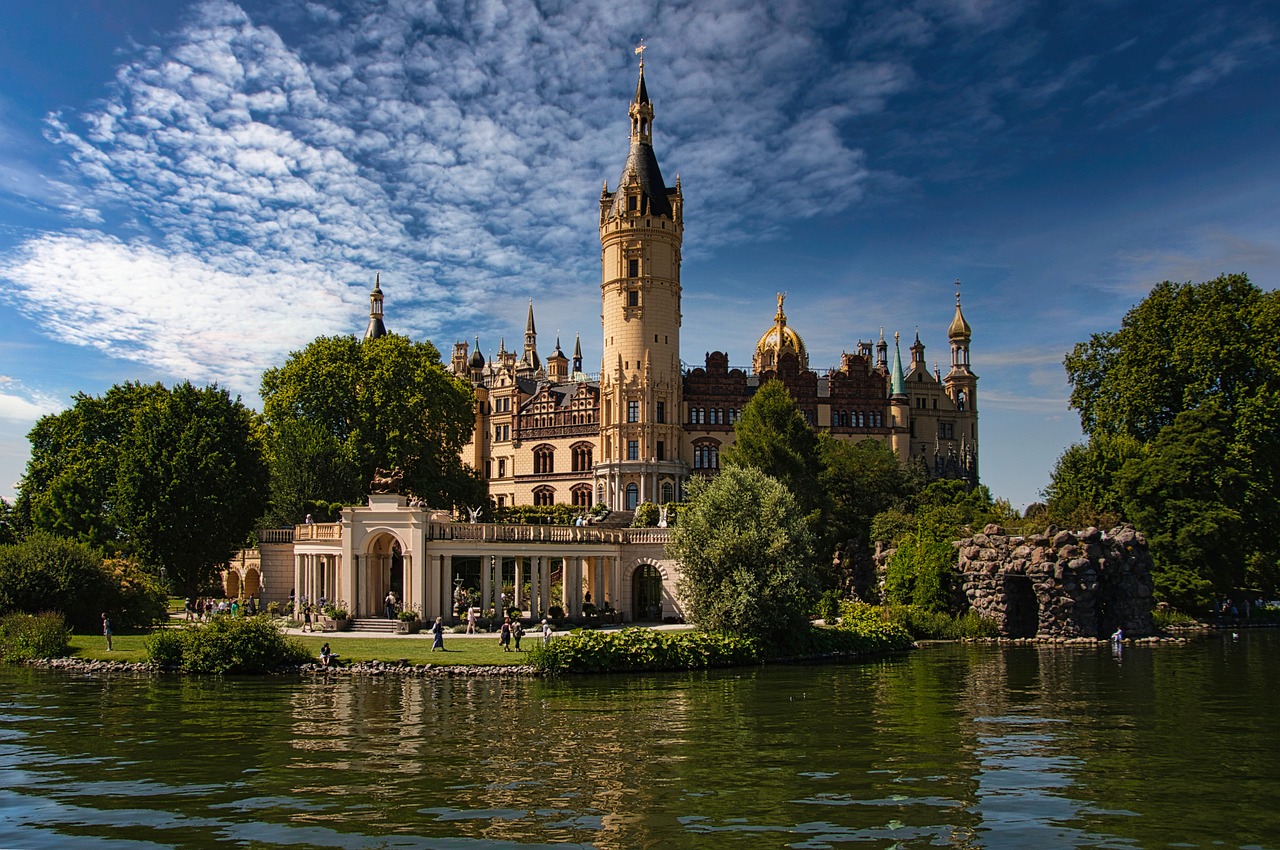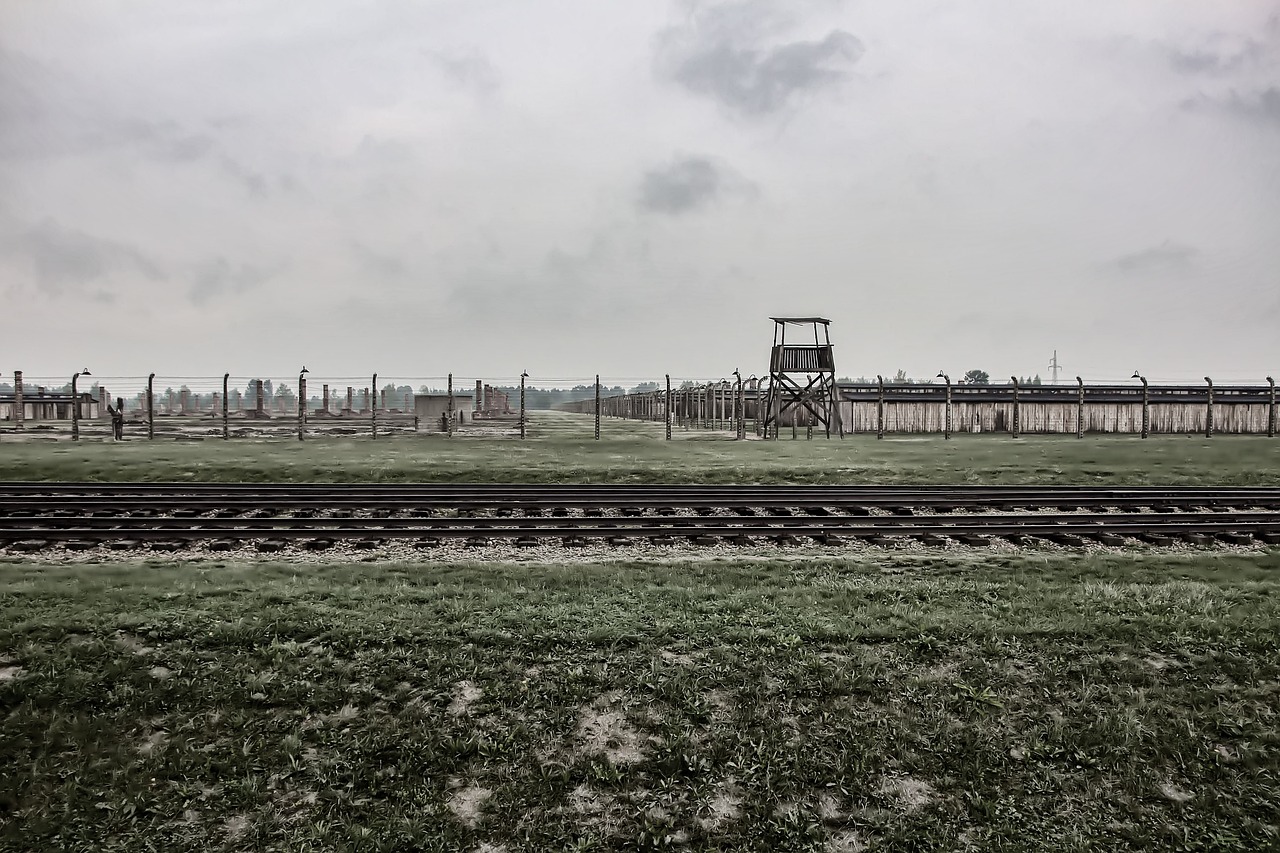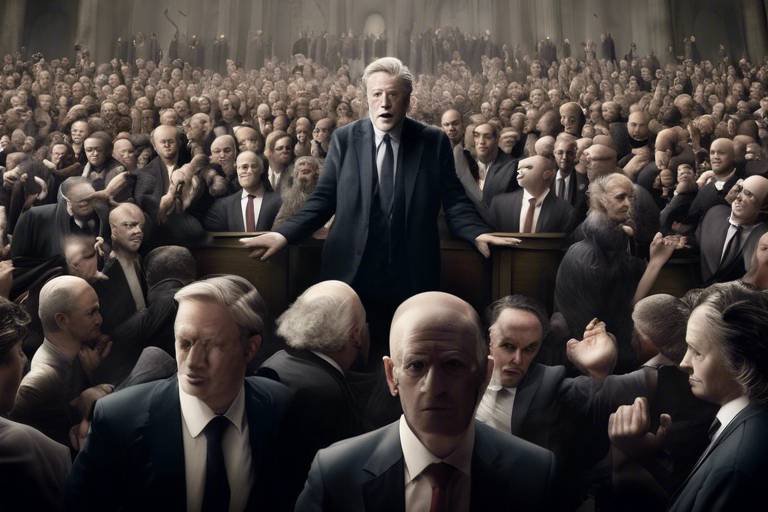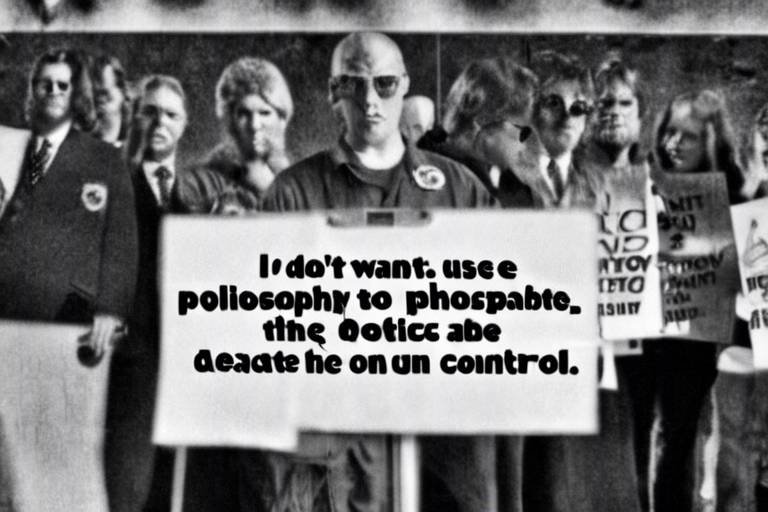Politics in Philosophy - Evolution over Ages
Politics and philosophy have danced together for centuries, each influencing the other in profound ways. The evolution of political thought is not merely a timeline of events; it's a tapestry woven with the ideas, struggles, and aspirations of humanity. From the ancient musings of philosophers like Plato and Aristotle to the modern debates surrounding social justice and globalization, the journey of political philosophy is as rich and complex as the societies it seeks to understand. Each era has brought forth unique challenges and questions, shaping our understanding of governance, justice, and power. As we delve into this fascinating evolution, we will uncover how these ideas have not only reflected the times but also helped to mold them, crafting the very fabric of our political realities.
In the cradle of civilization, ancient political philosophy laid the foundational stones for future discourse. Thinkers like Plato and Aristotle explored profound concepts such as justice, governance, and the ideal state. Plato, in his work "The Republic," envisioned a society ruled by philosopher-kings, emphasizing the importance of wisdom in governance. Aristotle, on the other hand, took a more empirical approach, analyzing various political systems and advocating for a balanced government that serves the common good. Their ideas have echoed through the ages, shaping political discourse and serving as reference points for countless philosophers who followed.
As we transitioned into the medieval period, political philosophy became deeply intertwined with theology. Thinkers like Augustine and Aquinas examined the relationship between divine authority and earthly power. Augustine's notion of the "City of God" contrasted sharply with the "City of Man," emphasizing the moral responsibilities of rulers and the governed. Aquinas further developed these ideas, arguing that human laws should reflect divine law, thereby influencing governance and moral philosophy. This period marked a significant shift in how power was perceived, intertwining it with ethical considerations that still resonate today.
The Renaissance era ignited a revival of classical ideas, emphasizing human agency and secular governance. Philosophers like Machiavelli emerged, challenging traditional views of morality in politics. His work "The Prince" is often seen as a pragmatic approach to power, suggesting that the ends justify the means. This shift towards realism in political thought encouraged leaders to prioritize effectiveness over ethical considerations, setting the stage for modern political strategies that continue to provoke debate.
The Enlightenment was a period of radical transformation, introducing the concept of the social contract. Philosophers such as Hobbes, Locke, and Rousseau passionately debated the nature of government, individual rights, and the legitimacy of authority. Hobbes viewed the state of nature as chaotic, advocating for a strong central authority to maintain peace. In contrast, Locke emphasized natural rights and government as a protector of these rights, while Rousseau championed the idea of the general will, arguing for a more direct form of democracy. These discussions laid the groundwork for modern democratic societies, influencing political structures worldwide.
With the rise of industrialization came Karl Marx, whose critique of capitalism and emphasis on class struggle reshaped political philosophy. Marx argued that the history of society is the history of class struggles and advocated for a revolutionary approach to societal change. His vision of a classless society challenged existing power structures and inspired movements across the globe, making his ideas a cornerstone of modern political thought.
As the 20th century unfolded, existentialist thinkers like Sartre began to examine the individual's role within society. They emphasized personal freedom and responsibility, challenging traditional political ideologies that often prioritize the collective over the individual. Sartre's assertion that "existence precedes essence" questioned the very foundations of political authority, highlighting the complexities of human existence and the need for authentic engagement in political processes.
Emerging as a powerful critique of traditional political thought, feminist political philosophy addresses issues of gender, power, and justice. Thinkers like Simone de Beauvoir and Judith Butler explored the intersection of feminism and politics, challenging patriarchal structures and advocating for equal representation and rights. This movement has reshaped political discourse, bringing attention to marginalized voices and highlighting the importance of inclusivity in governance.
In the late 20th century, postmodernist thinkers began to question the foundations of political authority and truth. They emphasized the role of language, culture, and identity in shaping political realities, challenging established narratives and encouraging a more nuanced understanding of power dynamics. This shift has led to a more critical approach to political discourse, urging individuals to interrogate the sources of authority and the implications of their beliefs.
Today, contemporary political philosophy grapples with modern challenges such as globalization, environmental ethics, and social justice. Current debates reflect the evolution of political thought in response to an increasingly complex world. Philosophers are now tasked with addressing pressing issues that transcend borders, urging a re-examination of traditional paradigms to foster a more equitable and sustainable future. As we navigate these turbulent waters, the insights gleaned from the rich history of political philosophy will undoubtedly guide us towards more informed and responsible governance.
- What is political philosophy? Political philosophy is the study of fundamental questions about government, justice, rights, and the role of individuals in society.
- Who are some key figures in political philosophy? Key figures include Plato, Aristotle, Hobbes, Locke, Rousseau, Marx, and contemporary thinkers like Judith Butler.
- How has political philosophy evolved over time? Political philosophy has evolved from ancient discussions on governance to modern debates on globalization and social justice, reflecting changes in society and human thought.
- Why is political philosophy important? It helps us understand the principles that govern societies, informs political action, and shapes our views on justice, rights, and power dynamics.

Ancient Political Philosophy
Ancient political philosophy laid the groundwork for future thought, with remarkable thinkers like Plato and Aristotle exploring profound concepts of justice, governance, and the ideal state. Their ideas were not just academic musings; they were deeply intertwined with the social and political realities of their time, influencing the course of political discourse for centuries to come. Imagine a world where the foundations of governance were being debated in the agora of Athens, where philosophers engaged in lively discussions about the nature of power and the role of the individual in society.
Plato, in his seminal work The Republic, proposed the idea of a philosopher-king, arguing that the most knowledgeable should rule for the benefit of all. He believed that a just society could only be achieved if those in power were wise and virtuous. This notion of the 'ideal ruler' continues to resonate in contemporary discussions about leadership and governance. On the other hand, Aristotle took a more empirical approach. In his work Politics, he categorized different forms of government and emphasized the importance of the middle class in achieving stability and justice. Aristotle's belief that "man is by nature a political animal" highlights the intrinsic connection between human beings and their political structures.
These ancient philosophers didn't just stop at theoretical frameworks; they also examined the ethical dimensions of politics. They posed critical questions: What is the purpose of government? How should power be distributed? What constitutes a just society? Their explorations paved the way for future political theories and continue to influence modern political thought. For instance, the idea of justice as a central theme in political philosophy can be traced back to these ancient discussions.
Moreover, the political thought of this era was not limited to just Greece. In the East, thinkers like Confucius were also contemplating the role of morality in governance. His emphasis on virtue and ethical leadership presented a different yet complementary perspective to the Western philosophical tradition. The intersection of these ancient thoughts from different cultures illustrates a rich tapestry of ideas that have shaped political philosophy.
In summary, ancient political philosophy set the stage for a myriad of political theories that would follow. The inquiries of Plato and Aristotle into justice, governance, and the nature of power remain relevant today, reminding us that the quest for a just society is as old as civilization itself. As we delve deeper into the evolution of political thought, it’s essential to recognize the profound impact these early philosophers had on shaping our understanding of politics and governance.

Medieval Political Thought
During the medieval period, political philosophy underwent a significant transformation as it became deeply intertwined with theological considerations. This era was marked by a quest to understand the relationship between divine authority and earthly power. Thinkers such as Augustine of Hippo and Thomas Aquinas played pivotal roles in shaping this discourse, emphasizing that governance should reflect moral and divine principles.
Augustine, in his seminal work The City of God, argued that there are two realms: the City of God and the City of Man. He believed that while earthly governments are necessary, they are ultimately flawed and transient. Augustine posited that true justice can only be found in the divine realm, suggesting that political authority should be guided by Christian values. This perspective laid the foundation for the idea that rulers must govern in accordance with a higher moral law, which resonated throughout the medieval period and influenced subsequent political thought.
On the other hand, Aquinas introduced a more systematic approach to political philosophy. In his work Summa Theologica, he articulated the concept of natural law, asserting that human beings possess an inherent sense of right and wrong. For Aquinas, the role of government is to promote the common good and ensure justice, aligning human laws with divine law. This idea of natural law became a cornerstone of medieval political theory, suggesting that legitimate authority must reflect moral truths that transcend human legislation.
Throughout the medieval era, the tension between church and state was a recurring theme. The question of whether political leaders should be subject to ecclesiastical authority or whether the church should wield political power was hotly debated. This dynamic led to significant conflicts, exemplified by the struggles between the papacy and various monarchs. The Investiture Controversy, for instance, highlighted the struggle for power and control between secular rulers and the church, raising questions about the legitimacy of authority.
Moreover, the medieval political landscape was characterized by the rise of feudalism, which shaped the relationship between lords and vassals. This hierarchical structure created a unique set of obligations and loyalties, influencing how power was distributed and exercised. The feudal system reflected the medieval mindset that authority was divinely ordained, with kings and lords seen as ruling by God's will. This belief further reinforced the idea that political authority was not merely a social construct but a manifestation of divine order.
In summary, medieval political thought was a rich tapestry woven from the threads of theology, morality, and governance. The contributions of thinkers like Augustine and Aquinas provided a framework that intertwined spiritual and temporal power, setting the stage for future developments in political philosophy. Their legacy continues to resonate, reminding us that the quest for justice and moral governance is as relevant today as it was in the medieval period.
- What was the main focus of medieval political thought?
Medieval political thought primarily focused on the relationship between divine authority and earthly power, emphasizing the need for governance to reflect moral and theological principles. - How did Augustine influence political philosophy?
Augustine's ideas about the two cities—City of God and City of Man—highlighted the impermanence of earthly governance and the necessity of aligning political authority with divine law. - What is natural law according to Aquinas?
Aquinas's concept of natural law posits that humans have an inherent understanding of right and wrong, and that laws should be based on these moral truths to promote the common good. - What role did feudalism play in medieval politics?
Feudalism established a hierarchical system of power and loyalty among lords and vassals, reflecting the belief that political authority was divinely ordained.

Renaissance Humanism
The Renaissance was a vibrant period that marked a significant shift in the way people viewed themselves and their place in the world. It wasn't just a revival of classical ideas; it was a full-blown cultural revolution that emphasized the importance of human agency, creativity, and rational thought. During this time, philosophers and thinkers began to challenge the longstanding notions of divine authority and the rigid structures of medieval governance. They argued that humans were not merely subjects of fate or divine will but active participants in shaping their own destinies.
One of the most influential figures of this era was Niccolò Machiavelli. His seminal work, The Prince, broke away from traditional moral frameworks and introduced a pragmatic approach to politics. Machiavelli proposed that the ends often justify the means, which was a radical departure from the idealistic views of his predecessors. He emphasized that rulers should focus on the practicalities of governance rather than the moral implications of their actions. This shift in perspective laid the groundwork for modern political thought, where the effectiveness of governance often takes precedence over ethical considerations.
Moreover, Renaissance humanism was characterized by a renewed interest in classical texts and the humanities. Thinkers like Erasmus and Thomas More engaged deeply with ancient Greek and Roman philosophies, promoting the idea that education and critical thinking were essential for personal and societal growth. They believed that through the study of literature, history, and philosophy, individuals could cultivate a sense of virtue and civic responsibility.
In essence, the Renaissance humanists contributed significantly to the evolution of political thought by:
- Promoting Individualism: They emphasized the importance of the individual and the potential for personal achievement.
- Advocating Secular Governance: They challenged the intertwining of church and state, arguing for a governance model based on reason and empirical evidence.
- Encouraging Civic Engagement: Humanists believed that educated individuals had a duty to participate in public life and contribute to the common good.
This philosophical movement did not merely influence political theory; it also had profound implications for art, science, and literature. Artists like Leonardo da Vinci and Michelangelo embodied the humanist ideals through their works, portraying the human experience with unparalleled depth and realism. Similarly, the scientific inquiries of figures like Galileo and Copernicus were fueled by the humanist belief in observation and reason, leading to groundbreaking discoveries that challenged established worldviews.
In conclusion, Renaissance humanism was a transformative force that reshaped the landscape of political philosophy and beyond. It encouraged a shift from a theocentric worldview to one that celebrated human potential and rationality. As we reflect on this pivotal period, it becomes clear that the seeds of modern democracy and individual rights were sown during the Renaissance, making it a cornerstone of contemporary political thought.
- What is Renaissance Humanism? Renaissance Humanism is a cultural and intellectual movement that emerged during the Renaissance, emphasizing the value of human agency, classical learning, and secular governance.
- Who were key figures in Renaissance Humanism? Notable figures include Niccolò Machiavelli, Erasmus, and Thomas More, who significantly influenced political thought and education.
- How did Renaissance Humanism impact politics? It shifted the focus from divine authority to human reason and individual rights, laying the groundwork for modern democratic principles.

Enlightenment and Social Contract
The Enlightenment was a transformative period that radically reshaped political thought, introducing the concept of the social contract. This theory, which posits that governments derive their authority from the consent of the governed, was championed by several key philosophers, including Thomas Hobbes, John Locke, and Jean-Jacques Rousseau. Each of these thinkers presented unique perspectives on human nature, governance, and the rights of individuals, which collectively formed the backbone of modern democratic principles.
Hobbes, in his seminal work Leviathan, argued that in the state of nature, life was "solitary, poor, nasty, brutish, and short." To escape this chaos, individuals consent to surrender some of their freedoms to a sovereign authority in exchange for security and order. This idea of a powerful ruler or government as a necessary evil was revolutionary, suggesting that the state is formed out of a collective agreement among individuals seeking safety.
In stark contrast, Locke viewed the social contract as a means to protect individual rights. He believed that people are inherently rational and capable of self-governance. In his work Two Treatises of Government, Locke argued that the primary role of government is to safeguard the natural rights of life, liberty, and property. If a government fails in this duty, citizens have the right to revolt. This notion laid the groundwork for modern democratic thought, emphasizing the importance of consent and the right to challenge authority.
Rousseau took a different approach, advocating for the idea of the "general will." In his book The Social Contract, he argued that true freedom is found in the collective will of the people, which transcends individual interests. Rousseau believed that individuals achieve their fullest potential when they participate in a democratic society that reflects the common good. His emphasis on civic participation and community responsibility continues to resonate in contemporary political discourse.
These Enlightenment thinkers not only influenced political theory but also inspired revolutionary movements across the globe. The American and French Revolutions, for instance, were deeply rooted in the principles of the social contract, challenging the divine right of kings and advocating for the rights of individuals. The ideas of Hobbes, Locke, and Rousseau sparked debates that continue to shape our understanding of governance and authority.
In summary, the Enlightenment and the development of social contract theory marked a significant shift in political philosophy. By questioning traditional forms of authority and advocating for individual rights, these thinkers laid the groundwork for modern democratic societies. Their ideas remind us that the relationship between the government and its citizens is not merely one of power but of mutual agreement and responsibility.
- What is the social contract theory? The social contract theory is a political philosophy that suggests individuals consent to form governments and abide by their rules in exchange for protection and the preservation of their rights.
- Who are the key philosophers associated with the social contract? The key philosophers include Thomas Hobbes, John Locke, and Jean-Jacques Rousseau, each offering different perspectives on human nature and the role of government.
- How did the Enlightenment influence modern democracy? Enlightenment thinkers emphasized individual rights, consent of the governed, and the right to challenge authority, which became foundational principles for modern democratic systems.

Marxism and Class Struggle
Marxism, a revolutionary framework developed by Karl Marx in the 19th century, fundamentally reshaped the landscape of political philosophy. At its core, Marxism critiques the capitalist system, arguing that it inherently creates class divisions and exploitation. The essence of Marx's theory is encapsulated in the concept of class struggle, which posits that history is driven by the conflict between different social classes—primarily the bourgeoisie (the owners of the means of production) and the proletariat (the working class). This struggle is not merely a backdrop to historical events; it is the engine that propels societal change.
Marx believed that the bourgeoisie, through their control over economic resources, wielded significant power, allowing them to shape laws, culture, and even ideologies to maintain their dominance. In contrast, the proletariat, despite being the backbone of production, found themselves alienated from the fruits of their labor. This alienation, Marx argued, led to a profound sense of disconnection and disenfranchisement among workers, who were often treated as mere commodities in the capitalist machine.
The revolutionary potential of the proletariat is a key tenet of Marxism. Marx envisioned a future where the working class would rise against their oppressors, overthrowing the capitalist system to establish a classless society. This vision is often summarized in the famous phrase from the Communist Manifesto: "Workers of the world, unite!" This rallying cry emphasizes the importance of solidarity among workers globally, transcending national boundaries to combat exploitation.
To understand the implications of Marxism on political thought, it’s essential to consider how Marx’s ideas influenced various movements and ideologies. The table below illustrates some of the key concepts and their impact:
| Concept | Description | Impact |
|---|---|---|
| Dialectical Materialism | The philosophical approach that views material conditions as the primary influence on societal development. | Laid the groundwork for analyzing historical progress through class struggles. |
| Historical Materialism | The theory that history is driven by material economic forces and class relations. | Influenced social sciences and historical analysis, prompting a shift towards economic perspectives. |
| Alienation | The separation of individuals from the products of their labor, leading to a loss of identity and purpose. | Highlighted the psychological effects of capitalism, inspiring labor movements and reforms. |
| Revolution | The overthrow of the capitalist system through collective action by the proletariat. | Inspired numerous revolutionary movements worldwide, including the Russian Revolution. |
Marxism has not only influenced political movements but has also sparked extensive debates within political philosophy. Critics often argue that Marx's vision of a classless society is utopian and impractical, leading to authoritarian regimes in practice. However, supporters maintain that the core critique of capitalism remains relevant, especially in an era marked by increasing inequality and economic crises.
In contemporary discussions, Marxism serves as a lens through which to analyze ongoing issues such as globalization, labor rights, and social justice. The idea of class struggle continues to resonate, as many advocate for systemic change to address the disparities exacerbated by capitalist practices. As we navigate the complexities of modern society, the dialogue surrounding Marxism and class struggle remains vital, prompting us to reflect on the power dynamics that shape our world.
- What is the main idea behind Marxism? Marxism argues that history is defined by class struggles, primarily between the bourgeoisie and the proletariat, and advocates for a classless society.
- How did Marxism influence political movements? Marxism inspired various revolutionary movements worldwide, emphasizing the need for collective action among the working class to overthrow capitalist systems.
- Is Marxism still relevant today? Yes, Marxism remains relevant as it provides a critical framework for analyzing economic inequality and advocating for social justice in contemporary society.

Existentialism and Politics
Existentialism, a philosophical movement that emphasizes individual existence, freedom, and choice, has had a profound impact on political thought. Thinkers like Jean-Paul Sartre and Simone de Beauvoir challenged traditional political ideologies by focusing on the complexities of human existence and the inherent responsibilities that come with freedom. They argued that individuals are not merely products of their environments or social structures; rather, they are active agents capable of shaping their destinies. This perspective raises critical questions: What does it mean to be free in a politically structured society? How do our choices affect the collective?
Sartre famously stated, "Existence precedes essence," suggesting that individuals must create their own values and meanings in a world that often feels absurd. This notion compels us to consider the implications of our choices within the political sphere. For instance, when faced with oppressive regimes or unjust laws, the existentialist perspective encourages individuals to resist and redefine their roles in society. This resistance is not just a political act but a profound assertion of personal agency and identity.
Moreover, existentialism highlights the importance of authenticity. In a political context, authenticity involves being true to oneself while navigating the often murky waters of societal expectations and norms. An authentic individual acknowledges their freedom and the weight of their choices, which can lead to a more engaged and responsible citizenry. This engagement is crucial in democratic societies, where the participation of informed and authentic individuals can drive social change and challenge the status quo.
The existentialist lens also brings attention to the concept of alienation. In modern societies, individuals may feel disconnected from political systems that seem distant or unresponsive to their needs. This alienation can lead to apathy or, conversely, to a passionate desire for change. Existentialist thinkers encourage individuals to confront their alienation and seek meaningful connections within their communities and political systems. By doing so, they can reclaim their agency and contribute to the collective good.
In addition, the intersection of existentialism and feminism, particularly through the works of Simone de Beauvoir, sheds light on the political dimensions of gender. De Beauvoir argued that women have historically been defined by their relationships to men, leading to a pervasive sense of otherness. By embracing existentialist principles, women can assert their freedom and challenge the patriarchal structures that seek to limit their agency. This feminist existentialism advocates for a political landscape where all individuals, regardless of gender, can exercise their freedom without oppression.
In conclusion, existentialism offers a rich framework for understanding politics through the lens of individual freedom, responsibility, and authenticity. It challenges us to recognize our role in shaping political realities and encourages active participation in the pursuit of justice. As we navigate the complexities of modern governance, the existentialist call for personal agency remains as relevant as ever, pushing us to confront our choices and their implications within the broader socio-political landscape.
- What is existentialism? Existentialism is a philosophical movement that emphasizes individual existence, freedom, and the necessity of personal choice.
- How does existentialism relate to politics? Existentialism encourages individuals to take responsibility for their choices and actions, which can lead to more engaged and authentic political participation.
- Who are key figures in existentialist thought? Jean-Paul Sartre and Simone de Beauvoir are two prominent existentialist philosophers whose works have significantly influenced political philosophy.
- What is the significance of authenticity in politics? Authenticity in politics refers to being true to oneself while engaging with societal norms, leading to responsible citizenship and active participation.
- How does feminist existentialism contribute to political thought? Feminist existentialism critiques traditional gender roles and advocates for women's freedom and agency within political structures.

Feminist Political Philosophy
Feminist political philosophy has emerged as a powerful critique of traditional political thought, challenging the male-centric narratives that have dominated the discourse for centuries. This branch of philosophy examines how gender intersects with power, justice, and governance, bringing to light the often-overlooked experiences and perspectives of women and marginalized groups. Thinkers like Simone de Beauvoir and Judith Butler have been instrumental in shaping this field, arguing that societal structures and norms are not just reflections of biological differences but are deeply rooted in historical and cultural contexts.
At its core, feminist political philosophy questions the very foundations of political authority and legitimacy. It posits that traditional theories of justice and rights have often excluded women and other marginalized identities, creating a need for a more inclusive approach to political theory. For instance, de Beauvoir's seminal work, The Second Sex, highlights how women have historically been defined in relation to men, thus advocating for a re-evaluation of what it means to be a human being in a political context. This re-evaluation invites us to consider the implications of gendered identities on our understanding of rights and responsibilities.
Moreover, feminist political philosophy also emphasizes the importance of intersectionality, a term coined by Kimberlé Crenshaw. This concept acknowledges that individuals experience multiple, overlapping identities—such as race, class, and sexuality—that shape their political experiences. By recognizing these intersections, feminist theorists argue for a more nuanced understanding of oppression and power dynamics. For example, the struggles faced by a woman of color cannot be fully understood without considering both her gender and racial identity, as well as the socio-economic context in which she lives.
As feminist political philosophy continues to evolve, it addresses contemporary issues such as reproductive rights, workplace equality, and violence against women. These discussions are not merely theoretical; they have real-world implications that affect millions of lives. The feminist critique of traditional political structures has led to significant advancements in policy and social change, pushing for reforms that promote gender equality and justice.
In summary, feminist political philosophy is not just about advocating for women's rights; it is about rethinking the entire framework of political thought to include diverse voices and experiences. It challenges us to question the status quo and to envision a more equitable society where everyone, regardless of gender, has a stake in the political process.
- What is feminist political philosophy?
Feminist political philosophy critiques traditional political theories and emphasizes the importance of gender in understanding power and justice. - Who are key figures in feminist political philosophy?
Key figures include Simone de Beauvoir, Judith Butler, and Kimberlé Crenshaw, among others. - How does feminist political philosophy address intersectionality?
It recognizes that individuals experience multiple identities that shape their political experiences, advocating for a nuanced understanding of oppression. - What contemporary issues does feminist political philosophy address?
It addresses issues like reproductive rights, workplace equality, and violence against women, aiming for social and political reforms.

Postmodernism and Political Discourse
Postmodernism, a philosophical movement that emerged in the mid-20th century, has profoundly influenced the landscape of political discourse. At its core, postmodernism challenges the grand narratives and ideologies that have historically governed political thought. It invites us to question the very foundations of authority, truth, and meaning in our political systems. Imagine a world where the once-clear lines between right and wrong, power and powerlessness, are blurred—this is the essence of postmodern thought.
One of the key features of postmodernism is its skepticism towards meta-narratives—those overarching stories that claim to explain everything. Think of the Enlightenment's promise of reason or Marxism's narrative of class struggle. Postmodernists argue that these narratives often exclude diverse voices and experiences, leading to a homogenized view of reality. Instead, postmodernism advocates for a plurality of perspectives, emphasizing that truth is subjective and constructed through language and culture.
This shift in perspective has significant implications for political discourse. It encourages a more inclusive dialogue that recognizes the complexities of identity, power, and social dynamics. For instance, consider how language shapes our understanding of political issues. The way we frame a problem can influence public perception and policy decisions. As such, postmodern thinkers urge us to be critically aware of the language we use and the narratives we promote.
Moreover, postmodernism highlights the role of identity in politics. It posits that individual experiences—shaped by factors such as race, gender, and class—profoundly impact political engagement and representation. This leads to a more nuanced understanding of power dynamics, as it acknowledges that marginalized groups often have different political needs and perspectives. For example, feminist and queer theories, rooted in postmodernism, challenge traditional political frameworks by advocating for a more equitable distribution of power and resources.
In the realm of political discourse, postmodernism also encourages a critical examination of established norms and institutions. It questions the legitimacy of traditional authorities, such as governments and political parties, prompting a re-evaluation of their roles in society. This skepticism can lead to a more vibrant and dynamic political landscape, where new ideas and movements can emerge. Think about the rise of grassroots activism and social movements that challenge the status quo—these are direct manifestations of postmodern thought in action.
However, the postmodern approach is not without its criticisms. Detractors argue that its emphasis on relativism can lead to a paralysis of action, where the lack of a unified truth makes it difficult to form cohesive policies or movements. Despite this, the impact of postmodernism on political discourse is undeniable. It has opened up new avenues for understanding and engaging with complex social issues, fostering a political environment that values diversity and dialogue.
To further illustrate the influence of postmodernism on political discourse, consider the following table that outlines key characteristics:
| Characteristic | Description |
|---|---|
| Skepticism of Meta-Narratives | Challenges overarching stories that claim to explain all political realities. |
| Plurality of Perspectives | Emphasizes the importance of diverse voices and experiences in political discourse. |
| Language and Power | Highlights the role of language in shaping political issues and public perception. |
| Identity Politics | Recognizes how individual identities influence political engagement and representation. |
| Critical Examination of Authority | Questions the legitimacy of traditional political institutions and norms. |
In conclusion, postmodernism has reshaped political discourse by encouraging a more critical and inclusive approach to understanding power and authority. It challenges us to rethink our assumptions and engage with the complexities of our political realities. As we navigate an increasingly interconnected and diverse world, the insights offered by postmodern thought remain essential for fostering meaningful dialogue and promoting social justice.
- What is postmodernism? Postmodernism is a philosophical movement that emerged in the mid-20th century, characterized by skepticism towards grand narratives and an emphasis on plurality and subjectivity.
- How does postmodernism influence politics? It challenges traditional political ideologies, encourages diverse perspectives, and critiques established authorities, leading to a more inclusive political discourse.
- What are some criticisms of postmodernism? Critics argue that its relativism can lead to indecision and a lack of cohesive action in political movements.

Contemporary Political Philosophy
Contemporary political philosophy is a vibrant field that grapples with the complexities of our modern world. As we navigate through the 21st century, issues such as globalization, environmental crises, and social justice take center stage. This era of political thought is not just a continuation of past ideas; it’s a dynamic response to the challenges that define our times. Think about it: how do we reconcile individual freedoms with collective responsibilities? How do we ensure that the voices of marginalized communities are heard in a world that often prioritizes the powerful?
At the heart of contemporary political philosophy lies a profound examination of **globalization**. This phenomenon has transformed economies, cultures, and political systems across the globe. Philosophers today are investigating the implications of a world that is increasingly interconnected. Questions arise: Does globalization dilute national sovereignty? Or does it create opportunities for a more equitable distribution of resources? The answers are complex and often contentious, reflecting the diverse perspectives that exist within this discourse.
Another pressing issue is **environmental ethics**. The climate crisis is not just an environmental concern; it’s a political one. Contemporary thinkers are urging us to reconsider our relationship with nature and the ethical implications of our actions. For instance, how should we balance economic growth with ecological sustainability? This has led to the emergence of eco-political theories that challenge traditional notions of progress and development. Many argue that a shift toward sustainable practices is not just desirable but necessary for the survival of future generations.
In addition to these global challenges, **social justice** remains a pivotal theme in contemporary political philosophy. The fight for equality and the recognition of diverse identities has gained momentum, prompting philosophers to explore the intersections of race, gender, and class. Thinkers like **Cornel West** and **Judith Butler** highlight how systemic inequalities shape our political landscape. They argue that understanding these dynamics is crucial for creating a just society. Moreover, contemporary movements such as Black Lives Matter and #MeToo have invigorated the discourse, emphasizing the need for inclusive policies that address historical injustices.
To encapsulate the essence of contemporary political philosophy, consider the following table that summarizes its key themes and contributors:
| Theme | Key Contributors | Key Questions |
|---|---|---|
| Globalization | Amartya Sen, Saskia Sassen | How does globalization affect national sovereignty? |
| Environmental Ethics | Arne Naess, Bill McKibben | What is our moral obligation to future generations? |
| Social Justice | Cornel West, Judith Butler | How do we address systemic inequalities? |
In conclusion, contemporary political philosophy is not just an academic exercise; it’s a vital tool for understanding and addressing the pressing issues of our time. As we continue to grapple with the complexities of modern life, the insights of philosophers will guide us in our quest for a more just and equitable society. The questions they raise are not merely theoretical; they resonate deeply with our lived experiences and the world we inhabit.
- What is contemporary political philosophy? It is a field of study that addresses modern political issues such as globalization, environmental ethics, and social justice.
- Who are some key figures in contemporary political philosophy? Notable philosophers include Amartya Sen, Judith Butler, and Cornel West.
- Why is social justice important in contemporary political thought? Social justice addresses systemic inequalities and advocates for the rights of marginalized communities.
- How does globalization impact political philosophy? Globalization raises questions about national sovereignty and economic disparity in a connected world.
Frequently Asked Questions
- What is the significance of ancient political philosophy?
Ancient political philosophy, particularly the works of Plato and Aristotle, laid the foundational concepts of justice, governance, and the ideal state. These ideas have influenced political discourse for centuries, shaping the way we understand power and authority in society.
- How did medieval political thought differ from ancient philosophy?
Medieval political thought intertwined with theology, focusing on the relationship between divine authority and earthly governance. Thinkers like Augustine and Aquinas explored how religious beliefs influenced political structures, contrasting with the more secular approaches of ancient philosophers.
- What role did Renaissance humanism play in political philosophy?
The Renaissance marked a revival of classical ideas, emphasizing human agency and secular governance. Philosophers like Machiavelli challenged traditional views, advocating for pragmatic approaches to power, which shifted the focus from divine right to human-centered political thought.
- What is the social contract theory?
Social contract theory emerged during the Enlightenment, with philosophers like Hobbes, Locke, and Rousseau debating the nature of government and individual rights. This theory posits that governments derive their authority from the consent of the governed, fundamentally shaping modern democratic principles.
- How did Marxism influence political philosophy?
Karl Marx's critique of capitalism and emphasis on class struggle reshaped political philosophy by advocating for revolutionary societal change. His ideas about a classless society challenged existing political structures and inspired movements aimed at social justice and equality.
- What is the impact of existentialism on politics?
Existentialist thinkers like Sartre emphasized personal freedom and responsibility, challenging traditional political ideologies. This perspective highlights the complexities of human existence and the individual's role within society, fostering a deeper understanding of political engagement.
- What does feminist political philosophy address?
Feminist political philosophy critiques traditional political thought by addressing issues of gender, power, and justice. Thinkers such as Simone de Beauvoir and Judith Butler explore how feminism intersects with politics, advocating for a more inclusive understanding of power dynamics.
- How do postmodernist thinkers view political discourse?
Postmodernist thinkers question the foundations of political authority and truth, emphasizing the influence of language, culture, and identity in shaping political realities. They challenge established narratives, encouraging a more nuanced understanding of power and its implications.
- What are the current challenges in contemporary political philosophy?
Contemporary political philosophy addresses modern challenges such as globalization, environmental ethics, and social justice. Current debates reflect the evolution of political thought in response to an increasingly complex world, adapting to new societal needs and dynamics.



















